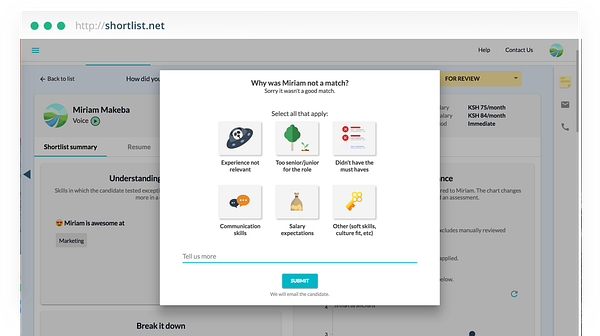When an employer works with us to recruit for an open position, we tailor an online application to include screening questions and assessments that gauge for the must-have skills they’re looking for. Once they’ve reviewed their list of top performers on our Talent Gallery, hiring managers get to provide feedback on their reasons for rejecting and or moving a candidate forward to the interview stage. After running over 200 jobs in 2018, we have a ton of data on what pushes a candidate over the line from “maybe” to “I need to meet them!”


Here are some of the main reasons, and corresponding tips for both hiring managers and candidates:
Assessment scores: High performance on skills assessments was one of the top reasons that hiring managers decided to move a candidate forward on the Shortlist platform. Prioritizing candidates based on assessment scores is a smart way for recruiters to spend their valuable interviewing time with candidates who have already shown they have the ability to perform on the job. After all, last year we found that SMEs in Kenya are spending around 19 hours conducting interviews for a single role!The Shortlist assessments approach is based on 85 years of research that show that cognitive tests, work samples, and structured interviews have the highest predictive value in understanding how someone will perform on a job.
Tip for hiring managers: How can you increase the value of assessments in selection? Learn from our white paper on Science of Hiring on Kenya.
Relevant experience: Experience remains a top factor in why an employer would choose to move forward with a candidate. This is because it gives the hiring manager the assurance of the candidate’s ability to apply relevant skills in the job for productivity. A degree qualification used to be a major deciding factor in who got the job, but since there’s been a rise in the acquisition of degrees over recent years in Kenya, employers are forced to focus more on experience.
Tip for candidates: Highlight key experiences in your job application and resume to avoid the chance of an employer discarding it without a second thought.
Potential: Candidate potential appeared to stimulate greater interest than actual accomplishments. In every instance that a hiring manager highlighted the potential of the candidate on our platform, the candidate ended up getting hired! For the hiring managers, candidates who had demonstrated an initial aptitude for their technical abilities and behavioural competencies stood a higher chance if they were considered to have future potential to make a bigger impact than the role they were applying for at the time.
Tip for candidates: As an applicant, use this to your advantage by emphasizing your future value, in addition to past achievements when applying for a job.
Tip for hiring managers: You probably know that performance is what you do, potential is what you could do. Here is a guide on hiring for potential over experience.
Culture Fit: Like potential, culture fit was a sure predictor of getting hired in 2018. What is even more interesting is that all the hiring managers who highlighted the culture fit were from Small and Growing Businesses (SGBs). Culture fit is crucial for SGBs mostly because they require a different approach from bigger companies, often seeking candidates who take initiative, seek growth opportunities, and are comfortable with ambiguity. The impact of hiring a great fit or a mismatch if often amplified in SGBS due to the small number of staff. Further to this, a study also shows that 84% of recruiters agree culture fit is an important factor in recruitment compared to skills.
Tip: Is the candidate someone who will perform well in your work environment and collaborate effectively with your existing team? If your answer is yes, then they are most likely a good fit. Successful companies such as Netflix and LinkedIn are already hiring for culture fit!
Stability: Although the least considered factor in recruitment, hiring managers remain cautious of profiles full of short job stints as they may be a sign of being unstable or disloyal. However, our data shows that if a candidate has the right experience and high assessment scores then hiring managers are likely to overlook the job-hopping. There’s no doubt about it — you will have to invest resources for a winning recruitment process, and wasting time, money and energy to hire someone who may not stick with you can be frustrating.
Tip: Before you write off candidates with meandering job history, adopt techniques for assessing job hoppers to ensure you don’t miss out on a star recruit.
All in all, recruitment is a test for both hiring managers and applicants. Candidates need to bring their best foot forward to stand a chance of being selected, while recruiters need to pick the best talent to ensure productivity and avoid spending so much time and resources in rehiring.





































